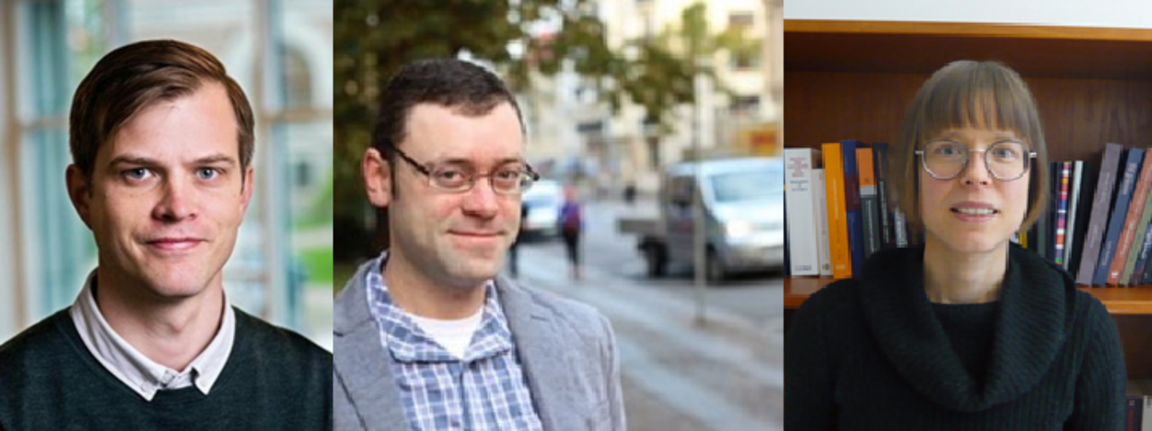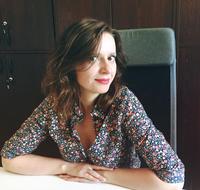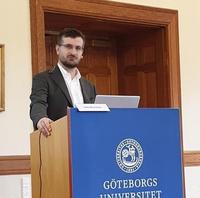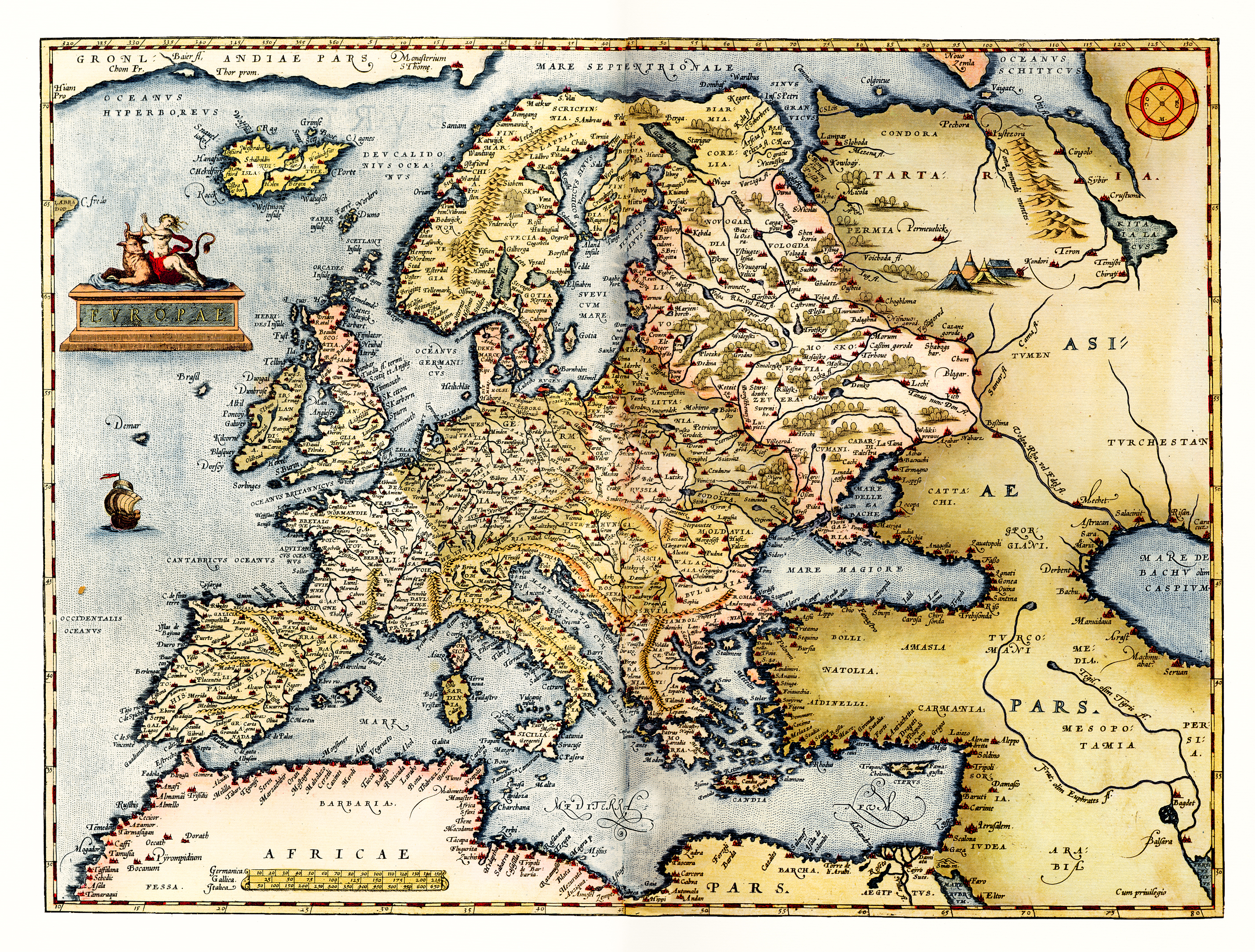Postdok på CERGU
Möt tidigare postdokar på CERGU
Postdok i CERGU-miljön
Att vara postdok på CERGU innebär en dubbel tillhörighet, dels den ämnesspecifika där man förväntas ingå på samma sätt som andra postdokar och lärare/forskare på ämnesinstitutionen. Utöver detta ingår och verkar man även i CERGU:s mångdisciplinära miljö och bidrar med sina ämnesspecifika perspektiv. Sitt kontor och formella anställning har man på sin ämnesinstitution men man träffar kollegorna från CERGU-nätverket varje vecka genom tisdagsfrukostar, arbetsseminarier, workshops och konferenser. Man har alltid tillgång till kollegor och forskningsstöd på CERGU och det finns goda möjligheter att initiera framtida flerdisciplinärt samarbete, som tex mångdisciplinära forskningsprojekt, konferenser, publikationer etc.

Postdok på CERGU
Från 2020
Möt två postdokar på CERGU
Nedan berättar två internationella postdokar om sina erfarenheter av CERGU. Vi har valt att inte översätta dessa intervjuer till svenska eftersom hela CERGU-miljön är svensk-engelskspråkig.
Katarzyna Wojnicka var postdoc på CERGU 2015-2017. Hon har nu anställning på Institutionen för Sociologi och Arbetsvetenskap som hon kombinerar med två forskningsprojekt som är placerade på CERGU.
1. Why did you choose to apply to be a postdoc at CERGU?
When I applied for a postdoc position in 2014 I was working as a project manager in one of the German research institutes in Berlin and since a while had considering coming back to academia, as I simply missed teaching and more advanced academic discussions. I applied for two postdoc positions, got both and eventually decided on CERGU as my research project was strictly European/transnational in character but I also felt that in Sweden I would have more freedom to conduct my research just the way I wanted it. And I was totally right.
2. How was your experience at CERGU and in Gothenburg during your time as a postdoc?
It was simply amazing (and still is, as at the end of 2019 I came back to CERGU after some years spent in German and British academia). I met fantastic people, both colleagues and friends, learnt (some) Swedish, had a chance to live in one of the most charming cities in Scandinavia and last, but not least, I have started to value the magical power of FIKA. I also learnt rain is not such a horrible thing after all.
3. What has your postdoc experience at CERGU offered you, and what would you say you have gained from the experience?
I cannot imagine having better opportunities than these given me by CERGU. First of all, due to a double affiliation, I had a chance to attend seminars organized by CERGU and Department of Sociology and Work Science, where I was based. In CERGU, due to its European character, I was managed to extend my academic horizons as many seminars went beyond my discipline and let me get familiar with new theories, methodological approaches and new paradigms related to European studies. At the Department of Sociology and Work Science I had a chance to advance my sociological expertise in the areas of my interests as I was able to participate in seminars organized by working groups dealing with gender, migration and social movements´ issues. Secondly, due to well-known characteristic of Swedish society, namely, working culture based on high level of collaboration, I attended many seminars where my papers and research proposals were minutely discussed by colleagues representing different backgrounds. This gave me a chance to receive a unique feedback and led to publications of several papers and winning two research grants from the Swedish Research Council. I am strongly convinced that without (a little) help from my colleagues, that might not be possible. Finally, CERGU is very supportive research environment. As a postdoc I received significant financial support that allowed me to participate in a number of international conferences organised by influential bodies such Council for European Research, European Sociological Association, International Sociological Association, to name just a few. More importantly, however, I received a lot of support delivered by CERGU people, from Birgitta, research coordinator, Angie, research administrator, and Linda, former director, among others.
Ettore Costa är postdok på CERGU 2018-2020 och har sitt kontor och sin anställning på Institutionen för Litteratir, Idéhistoria och religion.
1. Why did you choose to apply to be a postdoc at CERGU?
My research is on European history, especially on a comparative and transnational basis, so the European scope of CERGU was very attractive, especially as many History departments still cling to a nation-centred approach. The terms were ideal for that stage of my career: after tying up the last strands of my doctoral research, I needed breathing space to start working on the new research line, reading, publishing, discussing ideas and preparing applications. Plus, it had just enough teaching to acquire experience and marketable skills.
2. How was your experience at CERGU and in Gothenburg during your time as a postdoc?
My experience was extremely positive. The city and the country are very welcoming. From the beginning I had the full support of CERGU people in moving, settling in and becoming a member of the research community. It was a great experience from the professional and human side.
3. What has your postdoc experience at CERGU offered you, and what would you say you have gained from the experience?
The CERGU experience — from the seminars to the breakfast — gave me the opportunity to get to know people from different disciplines and backgrounds, which helped make my research sharper. I really appreciated the discussions of my research in the working seminars and the help in preparing new research applications. I have also improved my ability to work in groups and to communicate with the larger public, for example in the Gothenburg Science Festival. The postdoc life is uncertain and perilous, but these two years made me a more mature researcher and I am ready for the next stage of my career — hopefully here in Gothenburg.


